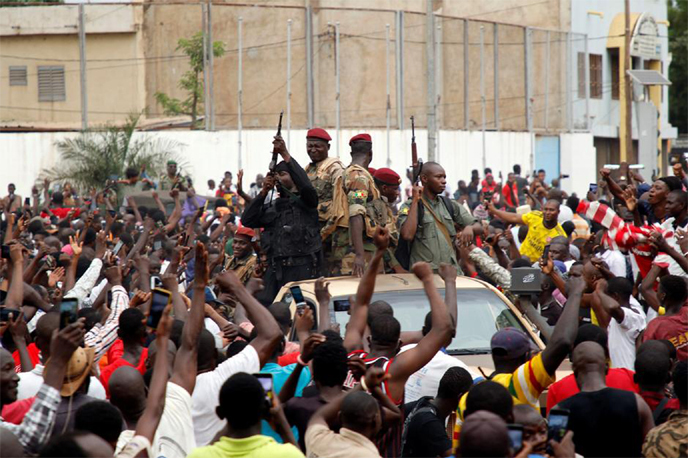
CNN :
Mali’s President Ibrahim Boubacar Keita announced his immediate resignation on state television late Tuesday, hours after he and the Prime Minister were arrested by mutinous soldiers in a coup.
Tuesday’s events sparked international condemnation and are likely to further destabilize the West African nation, following months of anti-government mass protests and a rising insurgency from Islamist militants.
Wearing a blue surgical mask amid the coronavirus pandemic, the President said on national broadcaster ORTM that he had little choice but to stand down to avoid bloodshed, and that the country’s national assembly and government would now be dissolved.
“For seven years I have with great joy and happiness tried to put this country back on its feet,” Keita said. “If today some people from the armed forces have decided to end it by their intervention, do I have a choice? I should submit to it because I don’t want any blood to be shed.”
On Wednesday morning, the military leaders behind the coup — a group who identified themselves as the National Committee for the Salvation of People (CNSP) — addressed the nation promising a political transition, elections within a “reasonable time,” and a national curfew.
Colonel Major Ismael Wague, a spokesperson for CNSP, announced that as of Wednesday, all air and land borders would be closed “until further notice” and a national curfew would be imposed from 9 p.m. to 5 a.m. local time.
“Civil society and socio-political movements are invited to join us in order, together, to create the best conditions for a civil political transition leading to credible regional elections for the democratic exercise, through a roadmap that will lay the foundations for a new Mali,” said Wague.
The military leader listed multiple grievances with Keita’s leadership, including allegations of corruption and the failure to deal with the long-running extremist insurgency.
Wague said that the CNSP is “not keen on power, but we are keen on the stability of the country which will allow us to organize general elections within a reasonable timeframe to allow Mali to equip itself with strong institutions capable of managing as well as possible. our daily lives and restore trust between governments and governed.”
Troops arrested the President and Prime Minister Boubou Cisse in a coup earlier on Tuesday, according to the chairman of the African Union Commission.
It followed reports of an attempted mutiny that morning at a military camp 15 kilometers (9.3 miles) outside of the capital Bamako, confirmed to CNN by a diplomatic source who had been briefed by local officials. The source spoke on the condition of anonymity, as they were not authorized to speak on the subject.
The source said the attempted mutiny took place in Kati, at the same camp that a successful military coup was launched back in 2012.
Mali’s President Ibrahim Boubacar Keita announced his immediate resignation on state television late Tuesday, hours after he and the Prime Minister were arrested by mutinous soldiers in a coup.
Tuesday’s events sparked international condemnation and are likely to further destabilize the West African nation, following months of anti-government mass protests and a rising insurgency from Islamist militants.
Wearing a blue surgical mask amid the coronavirus pandemic, the President said on national broadcaster ORTM that he had little choice but to stand down to avoid bloodshed, and that the country’s national assembly and government would now be dissolved.
“For seven years I have with great joy and happiness tried to put this country back on its feet,” Keita said. “If today some people from the armed forces have decided to end it by their intervention, do I have a choice? I should submit to it because I don’t want any blood to be shed.”
On Wednesday morning, the military leaders behind the coup — a group who identified themselves as the National Committee for the Salvation of People (CNSP) — addressed the nation promising a political transition, elections within a “reasonable time,” and a national curfew.
Colonel Major Ismael Wague, a spokesperson for CNSP, announced that as of Wednesday, all air and land borders would be closed “until further notice” and a national curfew would be imposed from 9 p.m. to 5 a.m. local time.
“Civil society and socio-political movements are invited to join us in order, together, to create the best conditions for a civil political transition leading to credible regional elections for the democratic exercise, through a roadmap that will lay the foundations for a new Mali,” said Wague.
The military leader listed multiple grievances with Keita’s leadership, including allegations of corruption and the failure to deal with the long-running extremist insurgency.
Wague said that the CNSP is “not keen on power, but we are keen on the stability of the country which will allow us to organize general elections within a reasonable timeframe to allow Mali to equip itself with strong institutions capable of managing as well as possible. our daily lives and restore trust between governments and governed.”
Troops arrested the President and Prime Minister Boubou Cisse in a coup earlier on Tuesday, according to the chairman of the African Union Commission.
It followed reports of an attempted mutiny that morning at a military camp 15 kilometers (9.3 miles) outside of the capital Bamako, confirmed to CNN by a diplomatic source who had been briefed by local officials. The source spoke on the condition of anonymity, as they were not authorized to speak on the subject.
The source said the attempted mutiny took place in Kati, at the same camp that a successful military coup was launched back in 2012.

